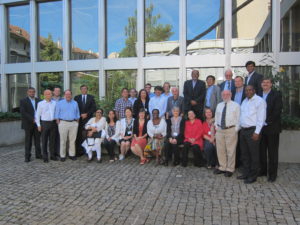 Last month, several CaT members participated in a consultation that aimed to evaluate the current state of Vi Conjugate typhoid vaccine research. This consultation was held July 2nd-3rd in Geneva, Switzerland.
Last month, several CaT members participated in a consultation that aimed to evaluate the current state of Vi Conjugate typhoid vaccine research. This consultation was held July 2nd-3rd in Geneva, Switzerland.
Currently, there are only two typhoid vaccines available on the international market that have demonstrated safety and efficacy: the parenteral Vi polysaccharide (ViPS) and oral, live attenuated Ty21a vaccines. Both vaccines offer only a moderate duration of protection.
There is hope that the introduction of next-generation typhoid vaccines may help to shrink the global burden of typhoid fever. There has been notable progress in the development of next-generation Vi Conjugate Vaccines (ViCVs). Several ViCVs are being developed, including two that have already received national licensure in India.
The formulation of global policy for ViCV use, as well as the creation of ViCV introduction programs in at-risk countries, will depend upon evidence-based recommendations from the WHO Strategic Advisory Group of Experts on Immunization (SAGE) and the WHO prequalification of at least one ViCV. The GAVI alliance plans to generate funding for ViCVs in 2017, with potential vaccine introduction in 2018. The WHO organized this expert consultation to assess the quality of current ViCV clinical data and identify any existing data gaps, thereby directing future ViCV research and ensuring an effective evidence-based process for the establishment of SAGE recommendations.
Experts presented the clinical data of four potential vaccines in various stages of development. There were additional presentations on immune response assessment, issues concerning the regulatory guidelines for ViCVs published by the WHO’s Expert Committee on Biological Standardization (ECBS), current vaccine policy and use, typhoid epidemiology, modeling of typhoid risk and the impact of vaccination.
It was determined by the group that the available clinical data on ViCVs is promising but not sufficient to advise the development of SAGE policy recommendations. There exists a dearth of data regarding immune memory, duration of protection, clinical efficacy, epidemiological risk factors, and vaccine impact. Once obtained, this data will help inform public health recommendations and policies. Additionally, the group established that there is a need for standardized assays to effectively compare different ViCVs. It was also recommended that the ECBS regulatory guidelines be amended so that immune-response parameters, such as T cell-dependent immune response and memory B-cell recruitment, are required in future ViCV studies.
To promote the studies needed to inform SAGE recommendations on ViCV use, the WHO will be working closely with relevant partners and stakeholders in the typhoid community. The WHO will also begin to take steps towards improving regulatory protocols regarding ViCVs.Until SAGE recommendations for ViCV use are established, the WHO recommendation to use ViPS and Ty21a vaccines should remain in place.
Click here for more information.


